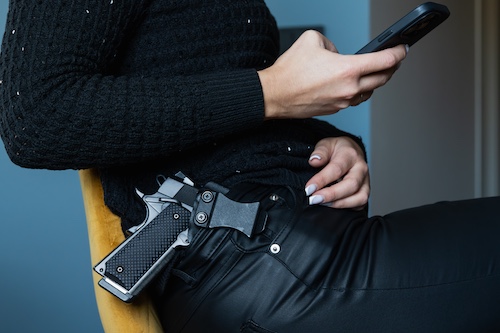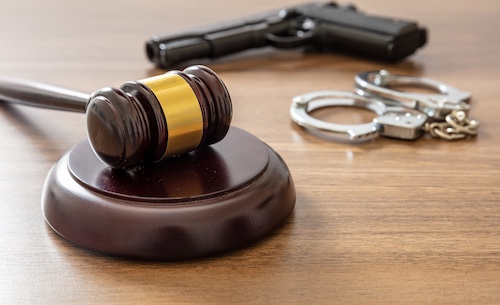Understanding the Consequences of Unlawful Possession of a Firearm in Tennessee
Unlawful possession of a firearm in Tennessee can lead to serious criminal charges and long-lasting effects on your life. Knowing what counts as unlawful possession, who cannot possess a firearm, and the penalties involved is important to avoid violating the law. A gun crimes lawyer can provide advice and representation if you are facing charges.
In this blog, we cover Tennessee’s laws on unlawful possession of a firearm, who cannot possess a firearm, the penalties involved, and why working with an experienced Nashville gun crimes attorney is important to protect your rights.
Defining Unlawful Possession of a Firearm in Tennessee
Understanding the meaning of unlawful possession of a firearm in Tennessee is important. This section covers the legal definitions and how they apply to individuals in the state.
What Does “Unlawful Possession of a Firearm” Mean?
In Tennessee, the law defines “unlawful possession of a firearm” as having a gun when you are not legally allowed to own or carry one. The key statute is Tennessee Code Annotated § 39-17-1307. This law explains who cannot carry or possess a firearm and what counts as a criminal offense. A person knowingly possessing a firearm without the legal right to do so can face serious charges.
Who Does the Law Apply To?
This law applies to any person with a felony conviction or someone who has a prior conviction for a violent or drug-related crime. It also includes individuals who have been committed to a mental institution or are subject to certain domestic violence restrictions. These rules are meant to stop gun violence and keep communities safe.
The Role of Actual Notice and Knowledge
For a charge of unlawful possession of a firearm, the person must have received actual notice or be shown to have known about their legal restriction. This means that the person must have known they were not allowed to have a gun. Actual notice is key in proving unlawful possession under Tennessee law.
Exceptions for Law Enforcement and Military
Certain people are not subject to these rules. Law enforcement officers acting in their official capacity and members of the military or intelligence agencies can carry firearms even if others cannot. These exceptions ensure that authorized government officials can carry firearms when needed for their duties.
Who is Prohibited from Possessing Firearms in Tennessee?
Knowing who cannot lawfully possess a firearm is essential for staying within the law in Tennessee.
Felons and Prior Convictions
Tennessee law prohibits individuals with a felony conviction from possessing a firearm. This applies to anyone with a prior conviction for a violent felony or a felony drug offense. The goal is to reduce gun violence and protect public safety by restricting firearm possession for those with serious criminal backgrounds.
Domestic Violence Offenders and Drug Crimes
The law also restricts firearm possession for people convicted of domestic violence or crimes involving drugs. These offenses show a history of violence or drug misuse that can threaten physical safety. Such a person is not allowed to possess a firearm or ammunition. The law aims to keep firearms out of situations that can escalate into more violence.
Mental Health Commitments and Court Orders
A person who has been committed to a mental institution or found to be mentally incompetent by a court cannot possess a firearm. The law focuses on mental health and the potential risks involved in having access to firearms.
Exceptions for Law Enforcement and Authorized Personnel
Certain people may still possess firearms in Tennessee, even if they would otherwise be prohibited. Law enforcement officers acting in their official capacity, members of the military, and those with a valid permit or authorization are not subject to these restrictions. The law recognizes that law enforcement officials and military members must carry firearms for their work.
Penalties for Unlawful Possession of a Firearm
Unlawful possession of a firearm in Tennessee can lead to serious criminal penalties.
Class B Felony
If a person with a prior conviction for a violent felony is found with a firearm, this is a Class B felony. A Class B felony in Tennessee can result in a prison sentence from eight to thirty years and a fine up to twenty-five thousand dollars. The penalties reflect the high risk posed by a person with a violent criminal record who has a firearm.
Class C Felony
A person with a prior felony drug offense who has a firearm commits a Class C felony. The sentence for a Class C felony is three to fifteen years in prison and a fine up to ten thousand dollars. The law takes gun violence related to drug crimes seriously to protect public safety.
Class E Felony
Other cases of unlawful possession of a firearm may be charged as a Class E felony. This can include possession of a firearm by a person prohibited by mental health orders or domestic violence orders. A Class E felony carries a sentence of one to six years in prison and a fine up to three thousand dollars.
Other Legal Consequences
Besides prison time and fines, a conviction can affect a person’s criminal history background information. It can limit future job opportunities and may lead to permanent loss of the right to possess firearms. Law enforcement authorities treat these cases with care to protect the safety of the community.
Defenses Against Charges of Unlawful Possession of a Firearm
A person facing charges of unlawful possession of a firearm has options for a defense in court.
Lack of Knowledge
A key element in these cases is that the person knowingly possessed the firearm. If the person did not know about the firearm’s presence or did not have actual notice of the legal restriction, this can be a strong defense. The law requires the state to prove that the person knowingly had the firearm.
Mistaken Identity or Valid Permit
Sometimes, law enforcement authorities make mistakes about who had the firearm. A mistaken identity defense can show that the person charged was not the one who actually possessed the firearm. In other cases, a person may have a valid permit or license to possess the firearm, and this can be a full defense to the charge.
Lawful Possession for Official Duties
Law enforcement officers acting in their official capacity, members of the military, and other authorized government officials may be allowed to possess firearms under Tennessee law. If the person was legally carrying the firearm for official law enforcement business, military work, or intelligence agencies, this can be a clear defense.
Role of a Gun Crimes Lawyer
A gun crimes lawyer can review the evidence and investigate possible defenses. They can question whether the person received actual notice of the restriction and if law enforcement acted within the law. A lawyer can also work to reduce charges or negotiate lesser penalties where possible.
Consult With an Experienced Nashville Gun Crimes Attorney ASAP!
If you have been charged with unlawful possession of a firearm in Tennessee, it is important to understand your legal options and protect your rights. Reach out to our team at Byron Pugh Legal today to schedule a consultation with an experienced Nashville gun crimes attorney who will stand by your side and work for the best outcome possible in your case.
Contact us at 615-255-9595 for a free case consultation today!









